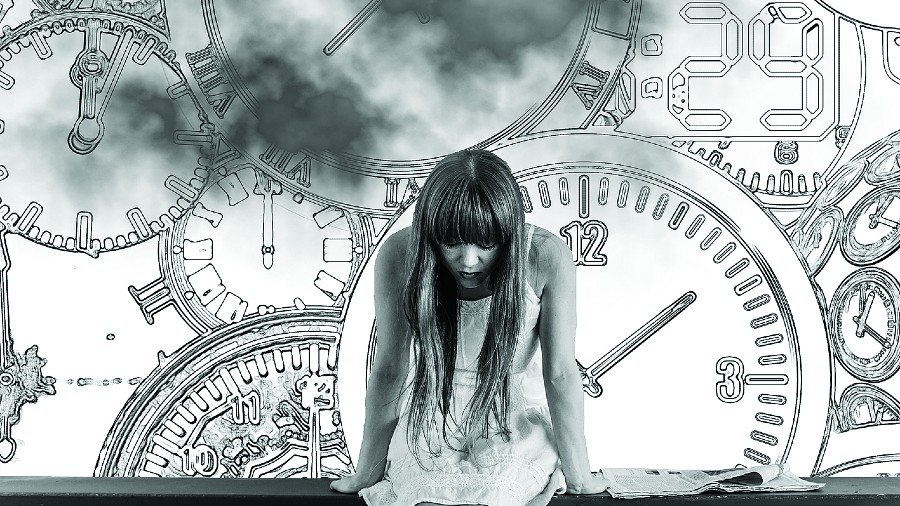We exist in time and occupy space and, for the most part, are usually fairly certain of the where and the when of our existence. There may be occasions when we are disorientated and unable to determine with certainty our where- and when-abouts, but these are relatively uncommon events in most lives, and our sense of self is typically quite solidly grounded in both space and time. Of course, neither time nor space is wholly objective, even if science tells us that they are, for how we perceive time and how we relate to space determine how we see ourselves in relation to the world around us. It was Aristotle (384-322 BCE) who, perhaps for the first time, noted how our perception of time was dependent on change and movement. In Book Four, Chapter 11 of his Physics, he writes of how “we apprehend time only when we have marked motion, marking it by ‘before’ and ‘after’; and it is only when we have perceived ‘before’ and ‘after’ in motion that we say that time has elapsed”. Such motion or change may be external — the movement of a body through space — or internal — the perception of change and movement within our minds. “But neither does time exist without change; for when the state of our own minds does not change at all, or we have not noticed its changing, we do not realize that time has elapsed, any more than those who are fabled to sleep among the heroes in Sardinia do when they are awakened; for they connect the earlier ‘now’ with the later and make them one, cutting out the interval because of their failure to notice it. So, just as, if the ‘now’ were not different but one and the same, there would not have been time, so too when its difference escapes our notice the interval does not seem to be time... the non-realization of the existence of time happens to us when we do not distinguish any change... when we perceive and distinguish [such change] we say time has elapsed... It is evident, then, that time is neither movement nor independent of movement.”
Virtually everyone I have spoken to during the last year has reported mild to severe distortions in their sense of space and time. For some, this has taken the form of being unable to reconstruct a sequence of events, mixing up the ‘before’ and the ‘after’ of a particular incident or series of incidents; others have spoken of how they confused the ‘here and now’ with the ‘there and then’; and yet others have recounted how their body clocks have been thrown out of kilter by the strangely hallucinatory nature of life during the ongoing pandemic. For some of them, time seems to have speeded up, and months have collapsed into mere days (“...it seems only yesterday that the first lockdown was imposed”), while, for others, time has slowed down so much that each day seems to last forever. This apparently paradoxical response to the passage of time is the subject of a research project conducted by the experimental psychologist, Ruth S. Ogden, of Liverpool John Moores University on The passage of time during the UK Covid-19 lockdown, whose findings are interesting, to say the least. According to Ogden, her “results showed that there was widespread distortion of time during lockdown, with more than 80% of people reporting that time felt like it was passing differently. But lockdown did not distort time in the same way for everyone. Instead, time sped up during lockdown for 40% of people and slowed down for the remaining 40%”. Why this should be so doesn’t seem to be very clear. Ogden suggests that age and “the negative emotions associated with isolation, boredom, sadness and stress may have contributed to a slowing of time” although she warns that “the effect of emotion on [our perception of] time is complex”.
One can only surmise how radically different the perception of time must be for a laid-off migrant worker having to somehow return to her or his home hundreds, maybe even thousands, of kilometres away from the place where she or he worked, and that of the house-bound white-collar worker whose job may not be in jeopardy but whose daily rhythms have been rudely disrupted as a result of the pandemic. About six months ago, when I called up a friend in a Birbhum village, he had told me of how several migrant workers of his acquaintance, who had returned home with great difficulty had become “lifeless” and “unwilling to look for work”, or even go out to collect the free rations being distributed to families by the state government. “They no longer believe there is a future,” my friend told me — a comment one has heard repeatedly from a varied assortment of individuals, ranging from students, to neighbours, to well-established friends holding down steady jobs. Hundreds of thousands of young people, whose final school board examinations have been put on hold, with not even tentative rescheduled dates announced, have now joined this chorus.
Our perception of time is shaped not only by past events, but also by the reasonable assumptions we make about what is likely to happen in the (more-or-less near) future. About two months back, most of us (myself included) were looking forward to a return to some semblance of pre-pandemic normalcy; now, with the second wave in full flow, that possibility seems to have been snatched away from us. On the one hand, the exponential increase of coronavirus cases is like a speeded-up film where time is ever-accelerating and, on the other, the way in which things remain the same (lockdowns, travel restrictions, closed schools and colleges, the list goes on) seems to have brought time to a standstill. Our vaunted ability to predict and/or control the future seems to have disappeared completely, and all we can do is helplessly observe a time that is both breathtakingly fast and heartbreakingly slow at one and the same moment. The paradox that is Covid-time offers neither hope nor consolation, only a bleak, terrifying future.
The author is professor of Comparative Literature, Jadavpur University, and has been working as a volunteer for a rural development NGO for the last 30 years











